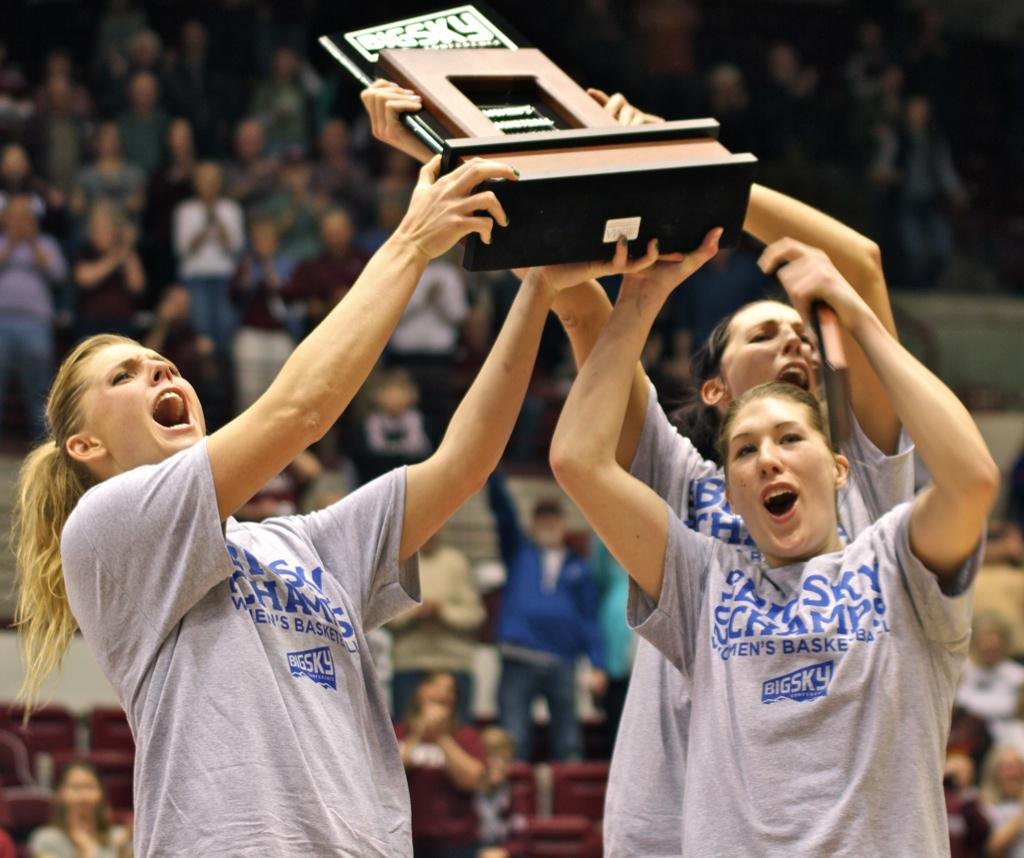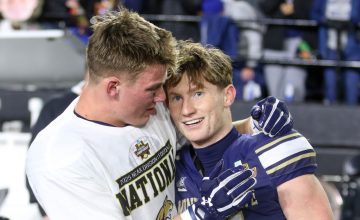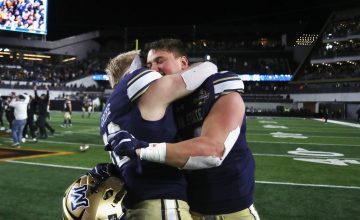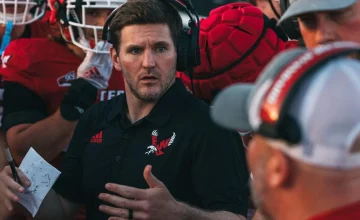Editor’s Note: This is the second installment of a two-part question and answer series with Big Sky Conference deputy commissioner Ron Loghry discussing the centralization of the Big Sky basketball tournament at a neutral site.
In an effort to ease fiscal concerns for athletic departments and basketball fans alike, the Big Sky Conference in April elected to centralize and combine its annual postseason tournament. Of the 32 major Division I basketball conferences, only six leagues give the hosting rights for conference tournament to the regular-season champions and the Big Sky is no longer one.
In April, after a year of consideration, the Big Sky chose Reno, Nevada for its new weeklong 24-team tournament the second week of March. The university presidents of the 12 full-time Big Sky schools chose the Biggest Little City in the World over a group of potential suitors that included Billings, Missoula, Spokane and Ogden.

EWU forward Venky Jois in last years championship game“This was an exhaustive process,” Big Sky commissioner Doug Fullerton said in a statement. “Reno, as a city and the folks that we worked with did a spectacular job in representing their community. We’re extremely excited about going to Reno for our championships.“One thing that always impressed me about the community is it’s a lot like the communities we have in the Big Sky. It’s a very similar feel. I know we’re going to be welcomed. The coaches and the fans attending are going to feel very good about coming to Reno.”
The American East, the Atlantic Sun, the Horizon, the Northeast and the Patriot League all have campus site tournaments. The Ivy League does not have a postseason tournament with its regular season champion earning the league’s auto bid to the NCAA tournament.
Turning the tournament into an event was a primary desire behind the decision to centralize the event and meld the men’s and women’s tournaments together. Fullerton, deputy commissioner Ron Loghry and the Big Sky wanted to make the tournament a more affordable event for schools and fans while increasing the postseason experience for all 24 teams in the league. The league weighed a multitude of other details before signing a three-year deal with the Reno-Sparks Convention and Visitors Authority for the first all-inclusive, six-day Big Sky Basketball tournament slated for March 7 through March 13 in 2016.
In mid-December, Loghry granted Skyline Sports a long interview to discuss the deciding factors in moving the tournament to a single site. Here is the second portion of the interview. Clear here for the first portion of the transcript.
Skyline Sports: Early on in this thing while people are still getting used to it and all 12 teams on both sides going, the early games during the week, do you worry about attendance at those things? Do you have a strategy for people coming out to the earlier games?
Loghry: “I think everybody is taking a really realistic view on this. Believe me, we are doing everything we can to get people to come. Our schools are as well. But the administrators sit in a room and this is why we want to do a three-year agreement because this wants to gain some traction. We haven’t, the Big Sky has never done this. Closest they came was 25 years ago, they knew the tournament was in Boise. That was a home institution, a home-court advantage, all those things.
“The Big Sky has never done a predetermined neutral site. For our fans, this is an odd thing for them. I wouldn’t call it push back but we heard from some fans, ‘why are you doing this? I loved when it was in Ogden because I’m in Ogden. We loved it when it was in Missoula because I’m a huge Griz fan.’
“We want them to come to the event for the event side of it not just because it’s in their back yard. We want basketball fans. That’s what we have to develop in this league is fans that will come and watch their teams play even when they are not at home.
“To answer your question, we know this first year we gotta really do a lot to get people here but it will build off that. We are going to make it a great event so the people who do come and the group we have will say to their neighbor that this is a really great thing, you should’ve been there. Word of mouth sells the championship and sells an event more so than you can by advertising.
“The early games will work because we know Reno is all in and they are pushing sales with everyone in town. We will also work with youth groups. They have a very robust youth center, three or four of them in town. We are working with them for, lack of a better term, like a field trip day for certain games to bring groups out. Even the local schools, we will sit them in sections and say hey, you are cheering for X teams. If you have ever been to a school that has field trip day, they are some of the loudest games you’ve ever been to.
“That’s our plan with the early games, especially with the Monday and the early Tuesday games. When those two days get over and you have teams that have won, you have winners moving on and they are playing the top four seeds on either side. Then it starts developing it’s own following. I think the people will come out and say, ‘Weber is going to play Montana. We remember those two teams.’ I don’t think there is going to be a lot of day-of. I think a lot of people will anticipate this tournament as we move through the bracket.”
Skyline: I’ve talked about this with several coaches in the league. With the way everything has progressed with HD TV and everything, you can really love Weber State but you can also watch Gonzaga or UCLA or Kentucky or Duke pretty much every night of the week. With the way everything has transformed and the immediate nature of everything, what do you think is the biggest challenge facing the Big Sky to get on to the national level and be a choice to go see each night?
Loghry: “Shifting away from the tournament, our biggest issue right now is non-conference scheduling. It’s not just getting teams, getting money and going and getting beat by 30. It’s scheduling games that you have a chance of winning and getting some home games. We have sat in rooms and talked about it until we are blue in the face. It’s difficult for the coaches in our programs to get those home games. It’s tough to get a Division I mid-level conference school to come to Bozeman, to come to Missoula. Weber State has built in games with Utah, Utah State and at times, BYU. They will play them there in Provo or Logan and the return game has to be neutral.
“Non-conference Division I scheduling is our No. 1 issue in this conference. It holds us back from rising to the level you see with Wichita State or Gonzaga or teams like that.”
Skyline: You see it at Montana State with us being here in Bozeman. The Bobcats are playing a brutal non-conference and they only have two home games. They hit the road, go play San Jose State, North Dakota State, Buffalo and Syracuse and then they open up conference on the road too. They might very well be 2-4 coming off that road trip before they get a home game against a familiar opponent. It’s a difficult issue.
Loghry: “Coach Fish at least, he’s playing those games. He knows what they mean. It’s his second year, he has a young team. Year 3, Year 4, those might be the games he goes in there and gets those guys. It’s the ones that want to play the non-Division I opponents that hurt the conference. That just drags everyone down. We start playing each other and the RPI just starts going down, drops like a wet ball if that’s the type of schedules we play. A robust schedule, Northern Colorado getting Colorado State the other night, that’s a huge win. That will help this conference when we start conference play. Montana State beat San Jose State the other night.
“Fish is playing the type of schedule that he needs to and then he goes and gets it. That’s what will make this conference better.”
Skyline: Is there any thought of putting pressure on schools to move more toward that? Those discussions have been had obviously but is there a way to get teams to not play non-D-I games? What’s the balancing act?
Loghry: “That’s the exact phrase: It’s a balancing act. We are allowed to have two non-Division I games. Just as you pointed out, Montana State is a good example. Those guys have just two home games. So we let our guys have two non-D-Is, have some home games, the reverse money games as we call them, get yourself a win, let your kids get their feet under them. We allow those two. But that’s what we limit. NCAA, you can do four. But we cut it in half to two. But the next step is to eliminate them but we have some locations where it is really, really tough for them to get D-I home games.
“You don’t want a team playing no home games. That’s just awful. We’ve had that before, a team playing seven straight road games, two big money games and they just get beat up. We want teams to have home schedules. We all say it that we need to do this but it’s just really hard. For example, Grand Canyon, our teams can’t get them to do a home and home. They have so much money, they just pay our teams to come play them in Phoenix. They are a WAC school that won’t even do a home and home. Grand Canyon is only borderline Division I, been Division I for five or six years.
“Bakersfield, up and coming, they would play everybody. They would come to all of our schools. Now to get a home and home with a Big West team is tough. They don’t have to go anywhere, to travel to Bozeman, to travel to Grand Forks. It’s just really hard to get return games on those.
“Some of them, I think Montana State was very creative with the University of Wyoming. Let’s do that, take a game to Billings. Billings is falling over itself to have Division I athletics there. I commend them because like I said, they did a great job of hosting us when we went there to look at it. I knew that Montana State would find success playing that Border War game there. They had the support.
“Sacramento State and Eastern Washington paired up this year and made a tournament where they got two Division I games out of it and it rotates next year to Cheney and they will do the same thing. The coaches are trying to find ways to get these games. They are not just going nuts and saying we can’t do it, play our two non-Division I games, go get killed on the road. No, they want to be better. They want to help this league. That’s the great thing. We are working together now.
“We helped them with the tournament. Now help us with the schedule to improve men’s basketball in this conference.”
Skyline: Last thing for you. What is the overall hope for this first season with this as the carrot at the end that everyone is chasing it? And what’s the initial hope for Reno, what will constitute a success this first year there?
Loghry: “To me, what would constitute success would be everyone saying that was a great postseason experience for our student-athletes and our fans because we haven’t been able to do that for them, for everybody. The way we have done it in the past, that was a great experience for a school. But not for everyone. When we talked to the student-athletes in the roundup afterwards, it was, ‘it was somebody else’s home court. I was playing on it.’ They loved playing in front of a crowd. That’s one thing we really want to strive for is having it be a great atmosphere, a championship atmosphere. But as the administrators and the student-athletes have said countless times, for the majority of our institutions and teams, their only post-season experience. One team is moving forward to the NCAAs. This is it for them. To have everybody involved, to have it be in a place where everyone has a fair chance, it’s a neutral site and there’s other things for people to do and they know where it’s at, the success for me would be for them to come away saying that was a great event and we build from that.”
Skyline: We are certainly excited that we can plan it out. It makes it a lot easier on the media guys when we know when and where we have to go months in advance.
Loghry: “The hard part with that many teams is it takes awhile. We start Monday and we go until Saturday. A couple of administrators have said, ‘If I have a really good men’s team and my women’s team is not that good or vice versa, when do my fans come in?’ Your men might play Monday and your women Thursday. That falls to the point though that a lot of our supporters aren’t the same people. We will take a look at the scheduling, the bracketing after we get this first year out of the way. We will look at all the problems and get them fixed to make this a sweet event.”
Photos by Brooks Nuanez. All Rights Reserved.

















